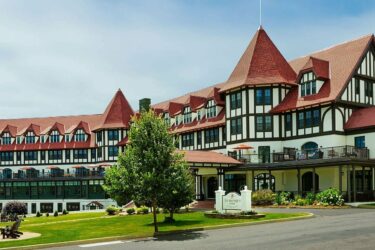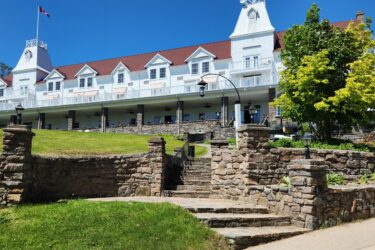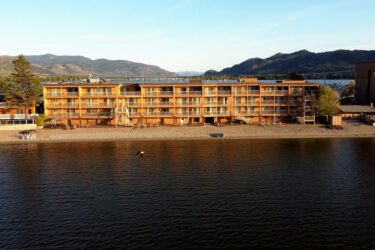
InnVest Hotels acquires The Algonquin Resort St. Andrews by‑the‑Sea, Autograph Collection and The Algonquin Golf Course
InnVest Hotels has acquired The Algonquin Resort St. Andrews by-the-Sea, Autograph Collection and The Algonquin Golf Course.
A national survey of Canadians recently authored by Hill+Knowlton Strategies says that commercial airlines and hotel chains should focus on an appeal to routine and not an aversion to risk.

By Jennifer Koster
The travel and tourism industry was undeniably one of the sectors hardest hit by the COVID-19 pandemic but their road to recovery can be gleaned from a national survey of Canadians recently authored by Hill+Knowlton Strategies. According to our research, commercial airlines and hotel chains should focus on an appeal to routine and not an aversion to risk.
Around the world, marketing teams at airlines and hotels are quickly rethinking their campaigns. There will be a strong inclination to scrap creative content predating COVID-19 and replace it with new messaging that tries to ease concerns about COVID-19. While that sounds like a reasonable response, our survey findings suggest it may miss the mark.
Not surprisingly, our data found that Canadians who were more likely to travel before COVID-19 are more likely to travel after it. Regular fliers, those who flew a few times a year or more, are more likely (+15 per cent points) to go back to skies compared to those who boarded a plane once a year or less. Put another way, travellers will just go back to their old routines.
We saw similar trends among hotel guests, with those who stayed in hotels a few times a year for vacations being more likely (+17 per cent points) to say they’d do so post-COVID compared to those stayed in hotels once a year or less. Those who stayed in hotels a few times a year for work were even more likely (+24 per cent points). Again, reverting back to their routines.
Moreover, certain demographic groups were more likely to resume their travel routine immediately with men being more likely do so than women (~ +12 per cent points) and those aged 35 to 54 being more likely do so than other age groups (~ +10 per cent points). Taken together, these results paint a picture of the kinds of ‘road warriors’ airlines and hotels should target.
How should they go about it? Here, again, the data offers some insights.
Our survey asked those who stayed at hotels to rank the considerations that will be most important to them when choosing between hotels post-pandemic. The following options were tested: Policies to protect guests from contracting COVID-19; price; ease of making reservations; flexible cancellation policies; loyalty rewards; and access to the outdoors/nature.
As consultants who often work with clients in the travel and tourism sector, what surprised us most about the findings is that loyalty programs ranked lowest — even below proximity to nature and the outdoors. Given that most frequent travellers have always been seen as relishing their rewards status, this particular data point suggests we may see a shift in their preferences.
Our research also showed that those travellers who said they would resume their hotel routine next week if given the chance were more likely to rank price as their top consideration — slightly ahead of policies to protect guests from COVID-19. While we didn’t put the ranking question explicitly to frequent flyers, their travel profile and that of hotel guests do correlate.
Based on our findings, then, we would likely advise hotel and airline clients to put cost and price at the heart of their marketing materials. And, to that end, while they’ve viewed trains or Airbnb as their main competition, their greatest threat now may be the low-cost lockdown alternative that is the ‘go-to’ option for grounded business travellers: Videoconferences.
In the immediate post-COVID recovery period, chief financial officers will be looking for ways to contain costs until revenues are restored. As such, business travel may be viewed as an expensive extravagance. To bring back those who travelled frequently for work, those most likely to want to resume their old travel routine, airlines and hotels must be cost competitive.
While our research suggests the more you travelled in the past the more you’ll want to get back to travelling in the future, that doesn’t mean that frequent travellers aren’t concerned about the risks. Rather, because they’re more accustomed to travel in the first place, they may be more likely to trust airlines and hotels to create safer and more hygienic travel experiences.
In the end, we all want to get back to some semblance of normal, but we recognize things have changed. Commercial airlines and hotel chains need to both compete on cost and safeguard the health of travellers. To do so, our research suggests they could cut back on the expensive reward programs that have traditionally been expected but are now a lower priority.
Jennifer Koster is Senior Vice President with Hill+Knowlton Strategies (Canada). The research referenced was taken from a survey of 994 Canadians from May 1 to 4, 2020, with a randomly selected weighted sampling with an associated margin of error of ±3.1 per cent, 19 times out of 20.



InnVest Hotels has acquired The Algonquin Resort St. Andrews by-the-Sea, Autograph Collection and The Algonquin Golf Course.

The new owners of the famed Windermere House hotel and resort on Muskoka’s Lake Rosseau intend to revitalize the building and its amenities while preserving the property’s historical integrity.

Proactive Hospitality has acquired the Coast Osoyoos Beach Hotel, B.C. CFO Capital arranged acquisition financing for the deal.

Tribute Portfolio – part of Marriott Bonvoy's extraordinary portfolio of 31 hotel brands – continues to grow its global family of characterful hotels with Honeyrose Hotel Montreal, a Tribute Portfolio Hotel, the brand's…